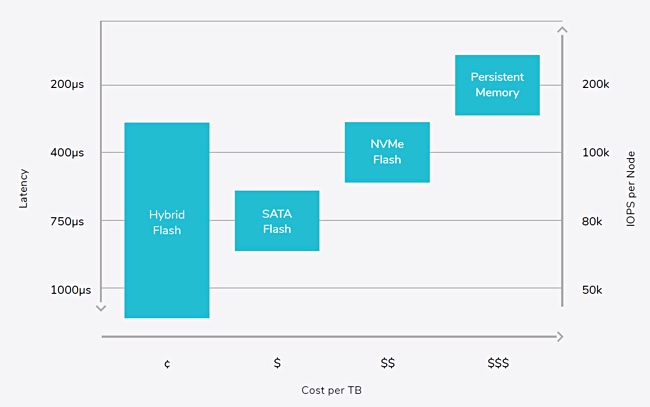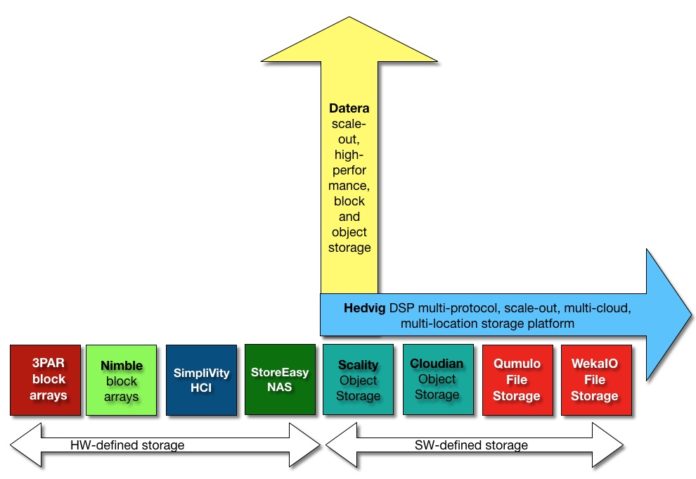HPE this week added Datera, a software-defined and scale-out storage supplier, to its HPE Complete program.
Hang on, HPE already works with Hedvig, another software-defined and scale-out storage supplier. What gives?
Datera
Datera began life in 2013 and gained $40m in VC funding three years later.
The company’s product is called Elastic Data Fabric and began shipping in 2017. It is best compared to Amazon’s Elastic Block Store.
Datera engineered its own data path to the physical storage devices, replacing the native paths in the Linux OS. You can get a technical overview of Datera’s software here.
Users see block and object storage that is both high-performance and scale out. Its data placement and load-balancing are automated, using machine learning technology, and the object storage uses Minio software .
This software runs on-premises or in the cloud using all-flash or hybrid nodes. Compatible servers include Datera X86 hardware, Dell, Fujitsu, Supermicro, HPE Apollo and ProLiant.
The hardware and software build a virtual SAN that is comparable to Dell EMC’s VxFlex product, based on ScaleIO software, and supports thousands of nodes, spanning multiple data centres, regions, and extending into the public cloud. Datera storage can deliver less than 200 microsecond latency and millions of IOPS across these nodes. VMware’s VSAN is a pygmy scale-out virtual SAN in comparison.

Datera customers include the world’s top travel ecommerce site (think 8million transactions/sec), a top five global airline, Ultimate Software, eDiscovery SaaS operator Morae Global, and the cloud service provider, Packet. They use Datera to supply storage to apps in bare metal, virtualised and containerised servers. In Packet’s case 18 data centres around the globe are involved, with automated operations.
Datera makes HPE complete
HPE, broadly speaking, offers two kinds of storage: hardware-defined and software-defined. Hardware products include 3PAR block arrays, with File Persona file support, mid-range Nimble block arrays, SimpliVity hyper-converged infrastructure and StoreEasy NAS. There is no HPE equivalent to Dell EMC’s Isilon filer.
On the software-defined storage side HPE is relatively weak and looks to partners to get this software running on its ProLiant and Apollo server hardware. There are varying levels of partnership, from meet-in-the-channel, through reselling to near-OEM.
I have made a diagram to position some of these partnerships:

There are two object storage partnerships; Cloudian and Scality. There are also two file storage partnerships we know of: Qumulo and WekaIO.
Qumulo is an Isilon-class competitor while WekaIO is more of a high-performance computing-class supplier.
As you can see there are two scale-out and multi-protocol storage software partnerships: Hedvig and Datera. I characterise them by positioning two scale-out arrows in different directions.
Hedvig is a multi-protocol (block, file and object) storage platform for broad scale-out across an enterprise’s data centres, branch offices and public cloud locations. Datera is a high-performance, dual-protocol (block and object), scale-out storage facility. There is some overlap between the two products and HPE has shoehorned some messaging differentiation for cleaner positioning.
Basically, Datera gives HPE a way to compete for Dell EMC VxFLEX (ScaleIO)-class opportunities, at up to 70 per cent lower cost, Datera says.
HPE Complete
HPE Complete provides Datera and HPE interoperability validation and facilitated troubleshooting for issue resolution. It is more than a reselling deal, with HPE both supplying and supporting the product. But it is less than an OEM deal as the third-party product retains its own branding.
Future possibilities
How might things develop? Interesting avenues could be the addition of file storage to Datera and an integration between Datera’s software and HPE’s InfoSight storage and server system management facility, using Rest APIs.
We also expect Datera’s software to support storage-class memory and NVMe over Fabrics. Datera suggests we might expect 80 microsecs latency off an Optane SSD.
And I would not be surprised if there was a funding round for Datera later this year…but this is mere conjecture on my part.








